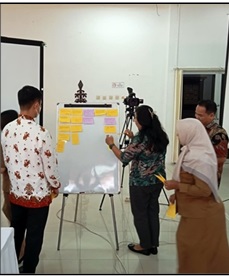Pendampingan Penyusunan Kajian Lingkungan Hidup Strategis sebagai Dasar dalam Pembangunan Berkelanjutan di Provinsi Kalimantan Tengah The Assistance of the Preparation of Strategic Environmental Assesment as A Foundation for Sustainable Development in the Province of Central Kalimantan
Main Article Content
Abstract
The sustainable development goals (SDGs) are agreed-upon common goals that must be met by all nations by 2030. Efforts to meet the SDG targets are a national development priority that necessitates the coordination of planning policies at the national and regional levels. In Central Kalimantan, the provincial and district/city governments are currently preparing various Strategic Environmental Assessment documents (SEA). The goal of this activity is to increase the working group's and experts' understanding of the principles of sustainable development that have become the basis and integrated into the development of a region, so that they can provide recommendations for environmental considerations at the strategic decision-making level, particularly after the 2024 joint national and provincial election. It has been carried out to reduce the obstacles that have previously been a problem by providing technical guidance on various tools for preparing and validating SEA. Following the training, it was discovered that the understanding and mastery of district/city working groups and university experts could improve compared to before the assistance series.
Downloads
Article Details

This work is licensed under a Creative Commons Attribution-ShareAlike 4.0 International License.
Authors who publish with this journal agree to the following terms:
- Any article on the copyright is retained by the author(s).
- Author grant the journal, right of first publication with the work simultaneously licensed under a Creative Commons Attribution License that allows others to share work with acknowledgment of the work authors and initial publications in this journal.
- Authors are able to enter into a separate, additional contractual arrangements for non-exclusive distribution of published articles of work (eg, post-institutional repository) or publish it in a book, with acknowledgment of its initial publication in this journal.
- Authors are permitted and encouraged to post their work online (e.g., in institutional repositories or on their websites) prior to and during the submission process, as can lead to productive exchanges, as well as earlier and greater citation of published work.
- The article and any associated published material is distributed under the Creative Commons Attribution-ShareAlike 4.0 International License
References
Badan Pusat Statistik. (2020). Catalog : 1101001. Statistik Indonesia 2020, 1101001, 790. https://www.bps.go.id/publication/2020/04/29/e9011b3155d45d70823c141f/statistik-indonesia-2020.html
Balane MA, Palafox B, Palileo-Villanueva LM, McKee M, Balabanova D. (2020). Enhancing the use of stakeholder analysis for policy implementation research: towards a novel framing and operationalised measures. BMJ Glob Health. Nov;5(11):e002661. PMID: 33158851; PMCID: PMC7651378. https://doi.org/10.1136/bmjgh-2020-002661
Brontowijono, W., L., R., & W., D. (2012). KLHS untuk Pembangunan Daerah yang Berkelanjutan. Jurnal Sains &Teknologi Lingkungan, 4(1), 43–54. https://doi.org/10.20885/jstl.vol4.iss1.art5
Fischer, T. B. (2002). Strategic environmental assessment performance criteria — the same requirements for every assessment? Journal of Environmental Assessment Policy and Management, 4(1), 83–99. http://www.jstor.org/stable/enviassepolimana.4.1.83
Brown, T. J., & Green, S. K. (2021). Leadership skills for managing change and transformation in educational institutions. Journal of Educational Administration, 59(2), 132-147. http://dx.doi.org/10.32479/irmm.13526
Hameed, A. A. (2019). Smart city planning and sustainable development. IOP Conference Series: Materials Science and Engineering, 518(2), 22042. https://doi.org/10.1088/1757-899X/518/2/022042
Kelly, R. A., Jakeman, A. J., Barreteau, O., Borsuk, M. E., ElSawah, S., Hamilton, S. H., Henriksen, H. J., Kuikka, S., Maier, H. R., Rizzoli, A. E., van Delden, H., & Voinov, A. A. (2013). Selecting among five common modelling approaches for integrated environmental assessment and management. Environmental Modelling and Software, 47, 159–181. https://doi.org/10.1016/j.envsoft.2013.05.005
Kuai, P., Li, W., Cheng, G., & Ren, G.-P. (2014). An application of system dynamics model into strategic environmental assessment of urban planning: a case study of Linfen city. Zhongguo Huanjing Kexue/China Environmental Science, 34, 1347–1354.
Kusuma,, B.M.A. (2014). The Role of Government in Overcoming Industrial Development Impact towards Environmental Sustainability. Jurnal Pembangunan dan Alam Lestari, 5(1)
Nugraha, S. A., Sudiatmi, T., & Suswandari, M. (2020). Studi Pengaruh Daring Learning Terhadap Hasil Belajar Matematika Kelas IV. Jurnal Inovasi Penelitian, 1(3), 265–276. https://doi.org/10.47492/jip.v1i3.74
Perdicoúlis, A. (2016). Systems thinking and SEA. Impact Assessment and Project Appraisal, 34(2), 176–179. https://doi.org/10.1080/14615517.2016.1152731
Umam, A. H. (2021). Rapid assessment of climate change issues in Indonesia strategic environmental assessment (SEA)-KLHS. IOP Conference Series: Earth and Environmental Science, 644(1). https://doi.org/10.1088/1755-1315/644/1/012045
UN SDSN. 2015. Data for development. A needs assessment for SDG monitoring and statistical capacity development. Technical Report. UNSDSN.
Widyasari, N. F. (2022). Strategi Pelaksanaan Tatap Muka (Pembelajaran Luring) Pasca Pandemi Covid-19. Journal of Instructional and Development Researches, 2(4), 153–161. https://doi.org/10.53621/jider.v2i4.98
Yahman, Y., Setyagama, A. (2023). Government policy in regulating the environment for development of sustainable environment in Indonesia. Environ Dev Sustain 25, 12829–12840 https://doi.org/10.1007/s10668-022-02591-1
Zhang, J., Luna-Reyes, L.F., Pardo, T.A. (2016). Information, Policy, and Sustainability: The Role of Information Technology in the Age of Big Data and Open Government. In: Zhang, J., Luna-Reyes, L., Pardo, T., Sayogo, D. (eds) Information, Models, and Sustainability. Public Administration and Information Technology, vol 20. Springer, Cham. https://doi.org/10.1007/978-3-319-25439-5_1
